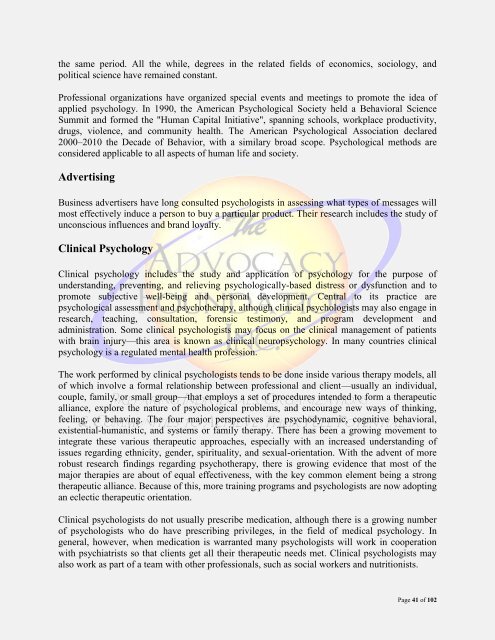Organizational Psychology - Vol. VI, Part III
Organizational Psychology - Vol. VI, Part III
Organizational Psychology - Vol. VI, Part III
You also want an ePaper? Increase the reach of your titles
YUMPU automatically turns print PDFs into web optimized ePapers that Google loves.
the same period. All the while, degrees in the related fields of economics, sociology, and<br />
political science have remained constant.<br />
Professional organizations have organized special events and meetings to promote the idea of<br />
applied psychology. In 1990, the American Psychological Society held a Behavioral Science<br />
Summit and formed the "Human Capital Initiative", spanning schools, workplace productivity,<br />
drugs, violence, and community health. The American Psychological Association declared<br />
2000–2010 the Decade of Behavior, with a similary broad scope. Psychological methods are<br />
considered applicable to all aspects of human life and society.<br />
Advertising<br />
Business advertisers have long consulted psychologists in assessing what types of messages will<br />
most effectively induce a person to buy a particular product. Their research includes the study of<br />
unconscious influences and brand loyalty.<br />
Clinical <strong>Psychology</strong><br />
Clinical psychology includes the study and application of psychology for the purpose of<br />
understanding, preventing, and relieving psychologically-based distress or dysfunction and to<br />
promote subjective well-being and personal development. Central to its practice are<br />
psychological assessment and psychotherapy, although clinical psychologists may also engage in<br />
research, teaching, consultation, forensic testimony, and program development and<br />
administration. Some clinical psychologists may focus on the clinical management of patients<br />
with brain injury—this area is known as clinical neuropsychology. In many countries clinical<br />
psychology is a regulated mental health profession.<br />
The work performed by clinical psychologists tends to be done inside various therapy models, all<br />
of which involve a formal relationship between professional and client—usually an individual,<br />
couple, family, or small group—that employs a set of procedures intended to form a therapeutic<br />
alliance, explore the nature of psychological problems, and encourage new ways of thinking,<br />
feeling, or behaving. The four major perspectives are psychodynamic, cognitive behavioral,<br />
existential-humanistic, and systems or family therapy. There has been a growing movement to<br />
integrate these various therapeutic approaches, especially with an increased understanding of<br />
issues regarding ethnicity, gender, spirituality, and sexual-orientation. With the advent of more<br />
robust research findings regarding psychotherapy, there is growing evidence that most of the<br />
major therapies are about of equal effectiveness, with the key common element being a strong<br />
therapeutic alliance. Because of this, more training programs and psychologists are now adopting<br />
an eclectic therapeutic orientation.<br />
Clinical psychologists do not usually prescribe medication, although there is a growing number<br />
of psychologists who do have prescribing privileges, in the field of medical psychology. In<br />
general, however, when medication is warranted many psychologists will work in cooperation<br />
with psychiatrists so that clients get all their therapeutic needs met. Clinical psychologists may<br />
also work as part of a team with other professionals, such as social workers and nutritionists.<br />
Page 41 of 102

















